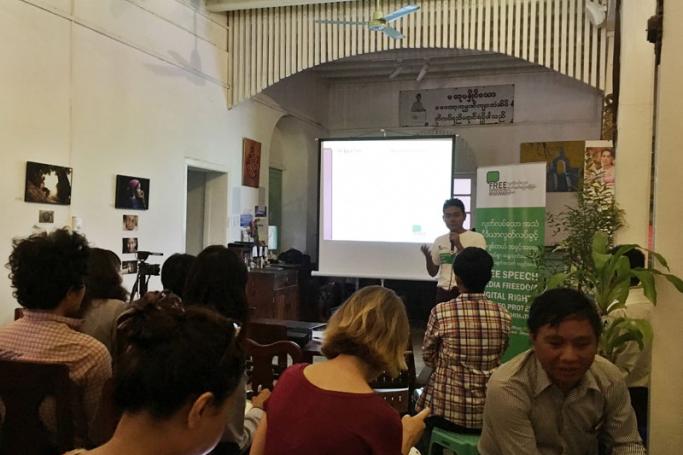Despite the ongoing democratic transition in Myanmar, the Myanmar government and state-related actors are still using a vague piece of legislation to curtail free speech online, according to a report launched this morning in Yangon by the NGO Free Expression Myanmar.
A total of 106 cases were filed between November 2015 and November 2017 using Article 66(d) of the 2013 Telecommunications Law, that punishes “extorting, defaming, disturbing, or threatening” people online, according to the study.
Free Expression Myanmar says that the vagueness of the law allows “people in power” to use it as a “tool” against free speech, and is asking for its repeal.
According to the study, more than half of the cases analyzed were complaints of “powerful people trying to censor or punish” criticism or allegations against them.
“Government officials should be less sensitive,” said Maung Saung Kha, the programme officer researcher of the organization.
All of the cases led to a conviction, and most defendants ended up receiving a six-months jail sentence.
The study points out that most of the complaints were filed on the grounds of defamation, but up to two thirds of the messages analyzed just contained opinions.
“A distinction should be made between people asserting a fact and speaking its opinion. Sharing your opinion shouldn’t lead to a defamation case,” said Maung Saung Kha.
The National League for Democracy-led government introduced several amendments to the law in August 2017, but didn’t give a more specific definition of what constitutes ‘defamation.’
“The article remains an obstacle to freedom of speech,” said Maung Saung Kha.
According to the study, 51% of the complainants are public servants or military officials, or employees related to political parties.
“There should be more tolerance of criticism, as the government receives our taxes, and should be controlled by the people,” said Yin Yadanar Thein, Programme Manager of Free Expression Myanmar.
On the other hand, up to 61% of defendants were either related to political parties, or from backgrounds that usually face censorship, such as activism, journalism or the arts.
According to the report, there are also problems in the judicial handling of these cases. Free Speech Myanmar says that the judiciary is accepting printed screenshots, that can be easily manipulated, as evidence in the courts.
Similarly, the study says that many of the judges from the country might not have “relevant skills” and the necessary “experience” regarding the internet and the use of social media to judge those cases.
Law against defamation still used to stifle free speech in Myanmar, activists warn
11 December 2017
Law against defamation still used to stifle free speech in Myanmar, activists warn












